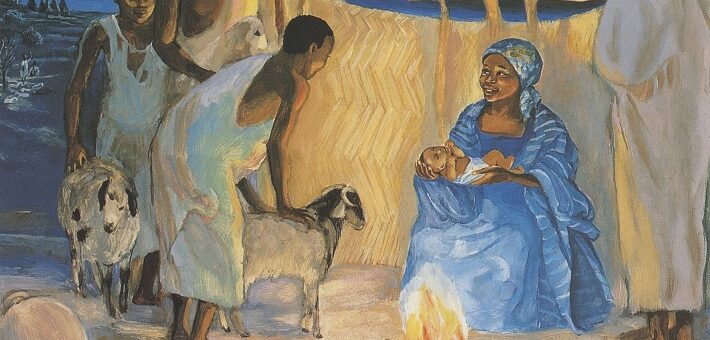Commentary on Luke 2:8-20
God made the announcement of Jesus’s birth to shepherds first.
They didn’t speak English. The text makes no indication that they could read. They were not spiritual leaders. Who knows when they were in a synagogue last. Luke says nothing about them having homes, families, or much of a livelihood beyond looking after wandering animals. They probably smelled like animals too. Yet they understood angelic instructions and grasped the glory of God. They were among the first witnesses of the nativity, seeing the babe before Jesus had even been named.
Keeping watch over a flock isn’t easy, especially in the country and at nighttime. We can imagine the first-century job of herding sheep as a task similar to gathering marbles on a surface sloping in many directions. Except that herding sheep was not a game. Darkness made the work not only trickier, but also dangerous, at times invisible, and cold. The shepherds in Luke, however, lived in the fields. They were experts. They knew how to weather changes in the atmosphere and terrain and deter sly predators like wolves, or thieves prowling in the night. These shepherds did not scare easily. They had likely seen some things on their watches, and even fought back to protect their sheep.
A stark contrast should therefore not go unnoticed that what caught them off guard was not a challenge or threat, but God’s radiant glory and an angel bearing “good news of great joy for all the people.” Overwhelming happiness and infinite light shook the shepherds to their core. The grind of their work had never satisfied them like that before. Yikes!
We come to today’s reading on Christmas Day. But Christmas did not exist for the shepherds spooked by the evening pronouncement of the Messiah’s birth. Maybe they observed other holidays like Passover, where one of their lambs would be slaughtered and transformed into a Passover meal to remember how God spared the Israelites or ‘passed over’ them, but struck down all Egyptian firstborn, both children and livestock, as an act of divine judgment in Exodus 12:1-32. Or, perhaps their work would cease for another seasonal harvest celebration like Sukkot, the celebration of God’s provision while the Israelites wandered in the wilderness in Leviticus 23:42-43.
How much they would have celebrated on those days, however, remains a historical mystery. Passover required lots of work, like the trading of many lambs. These days may not have been “days off.”
What Luke does tell us is that even though they were frightened, the shepherds did not hesitate to cut the night shift short after hearing of the Messiah’s birth. The news altered their priorities and responsibilities. God had invited them to discover the inauguration of new life for all. Their actions led to what we call “Christmas.”
Their route was uneven, meandering, and likely rocky; who knows how tedious it was traveling by twilight. Did the sheep go too? Though never stated in Luke, divine intervention must have led them to Mary and Joseph. How else could they have made it? Who would they have asked for directions at that time of night? There were many mangers in Bethlehem. How would they have located the exact one? And why would a baby deemed the Messiah be resting there? Nevertheless, they found the couple and their newborn. Just as the angel said, he was lying not in his mother’s arms, but where animals feed. This is the body of Christ, given for you.
When was the last time we hastily abandoned our work at the most inconvenient time to celebrate the presence of the Messiah in our lives? And the shepherds did more than that. They went where a savior should not be born, wowed parents who hardly seemed the best fit for the Christ, and praised God after visiting a pretty unimpressive site of world transformation.
With only the good news they received, they quit a sure thing that kept them alive — shepherding — for a miracle that introduced eternal life. In their own way, they did what a lawyer and “certain ruler” failed to ascertain in Luke 10:25; 18:18-20. Surrendering their occupation freed them to reach the living, breathing salvation of the world “wrapped in bands of cloth and lying in a manger” (Luke 2:12). They listened and went even though they were afraid.
Called by God, the shepherds left at a moment’s notice to go chasing after the newborn of two homeless, unwed foreigners from Galilee. The father was not even the biological father of the child. In fact, all that Luke seems to find interesting about Joseph at this point is his unremarkable descendance from David, who though a great king, was neither a role model for marriage nor family life. Mary and Joseph are not much to behold here in Luke. The unnamed and rugged shepherds are, however, spiritual pioneers.
On their way home, the shepherds also became the first evangelists, sharing good news lavishly. Mary treasured their words, even though she could have wanted so much more after giving birth in squalor. This is what the first “Christmas” looked like. Luke goes out of his way to begin the life of Jesus not with the elites, but rather, outcasts, descendants of slavery and exile, with mythological links to monarchy, hardened by work and wilderness, even as they are chosen and redeemed by God.
Pilgrims continue to visit the city of Jesus’s birth today. In modern history, Armenians and Syriacs sought refuge in Bethlehem during the Holocaust. Palestinians and Israelis have long contested claims to its land. Muslims now constitute the majority population. As preachers today, how might we go there now, by way of analogy, to improve how we serve our current contexts? Or literally, in order to keep faith like the shepherds and dare to do what it takes to see and proclaim the unexpected light and salvation of God breaking through the most unlikely parts of town again?
PRAYER OF THE DAY
God of proclamation, you sent shepherds to Mary to proclaim the good news that her child is God’s son. Send us into the world to proclaim the good news of your love to all who will hear. We pray these things in the name of Jesus Christ, our Savior and Lord. Amen.
HYMNS
O come, all ye faithful ELW 283, H82 83, UMH 234, NCH 135
O little town of Bethlehem ELW 279, H82 78, 79, UMH 230, NCH 133
Angels from the realms of glory ELW 280
CHORAL
Shepherd’s Pipe Carol, John Rutter


December 25, 2018